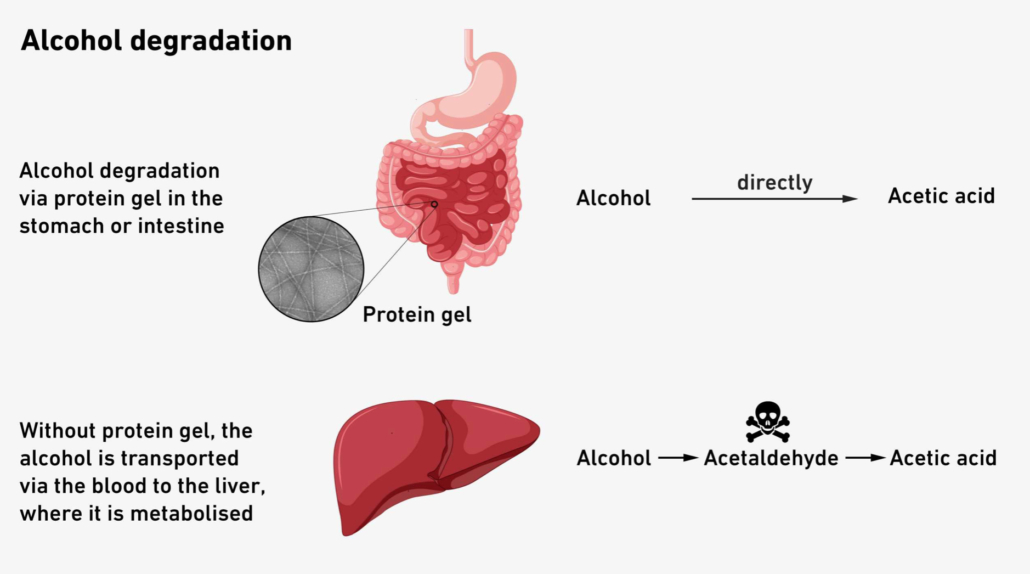Is this the answer to excessive alcohol consumption?
Researchers develop edible protein gel that mitigates alcohol intoxication
A team of researchers at ETH Zurich has developed an innovative protein-based gel that could potentially reduce the damaging and intoxicating impacts of alcohol consumption.

The alcohol reducing gel is formulated from common whey proteins
The groundbreaking work, published recently in Nature Nanotechnology [1], demonstrates – in mice studies – the gel’s ability to break down alcohol into harmless acetic acid before it enters the bloodstream, where it can develop it’s intoxicating effects.
According to the World Health Organization, around 3 million people die every year from excessive alcohol consumption
Gel made from common whey proteins
The gel is formulated from common whey proteins that are boiled to form long, cross-linked fibrils. Adding salt and water as a solvent then causes the fibrils to cross-link and form a gel.
“We immersed the fibrils in an iron bath, so to speak, so that they can react effectively with the alcohol and convert it into acetic acid,” says ETH researcher Jiaqi Su, the first author of the study.
Glucose and gold nanoparticles
Tiny amounts of hydrogen peroxide are needed to trigger this reaction in the intestine. These are generated by an upstream reaction between glucose and gold nanoparticles. Gold was chosen as a catalyst for hydrogen peroxide because the precious metal is not digested and therefore stays effective for longer in the digestive tract. The researchers packed all these substances – iron, glucose and gold – into the gel. This resulted in a multi-stage cascade of enzymatic reactions that ultimately converts alcohol into acetic acid.

Alcohol degradation in the body with and without the new gel.
Professor Raffaele Mezzenga, who leads the Laboratory of Food & Soft Materials at ETH Zurich, explained: “The gel shifts the breakdown of alcohol from the liver to the digestive tract. In contrast to when alcohol is metabolised in the liver, no harmful acetaldehyde is produced as an intermediate product.” Acetaldehyde, a toxic byproduct of alcohol metabolism, is a major culprit behind many alcohol-related health issues.
Alcohol levels reduced by 40% after 30 minutes
In mice dosed with alcohol, the prophylactic gel application reduced blood alcohol levels by 40% after 30 minutes and 56% after 5 hours compared to controls. Acetaldehyde accumulation was also diminished, resulting in less liver stress and improved biomarkers. Mice given the gel alongside chronic alcohol intake exhibited less weight loss, liver damage, and metabolic disruptions compared to their alcohol-only counterparts.
While abstinence remains the healthiest approach, Mezzenga notes the gel “could be of particular interest to people who don’t want to give up alcohol completely, but don’t want to put a strain on their bodies and aren’t actively seeking the effects of alcohol”.
The researchers have filed a patent for the innovative gel formulation. Though clinical trials are still required for human approval, the team is optimistic given the gel’s composition relies on edible whey proteins. In the future, the gel could be taken orally before or during alcohol consumption to prevent blood alcohol levels from rising and acetaldehyde from damaging the body. In contrast to many products available on the market, the gel combats not only the symptoms of harmful alcohol consumption but also its causes.
Reference
- Su, J., Wang, P., Zhou, W. et al. Single-site iron-anchored amyloid hydrogels as catalytic platforms for alcohol detoxification. Nanotechnol. (2024). https://doi.org/10.1038/s41565-024-01657-7


